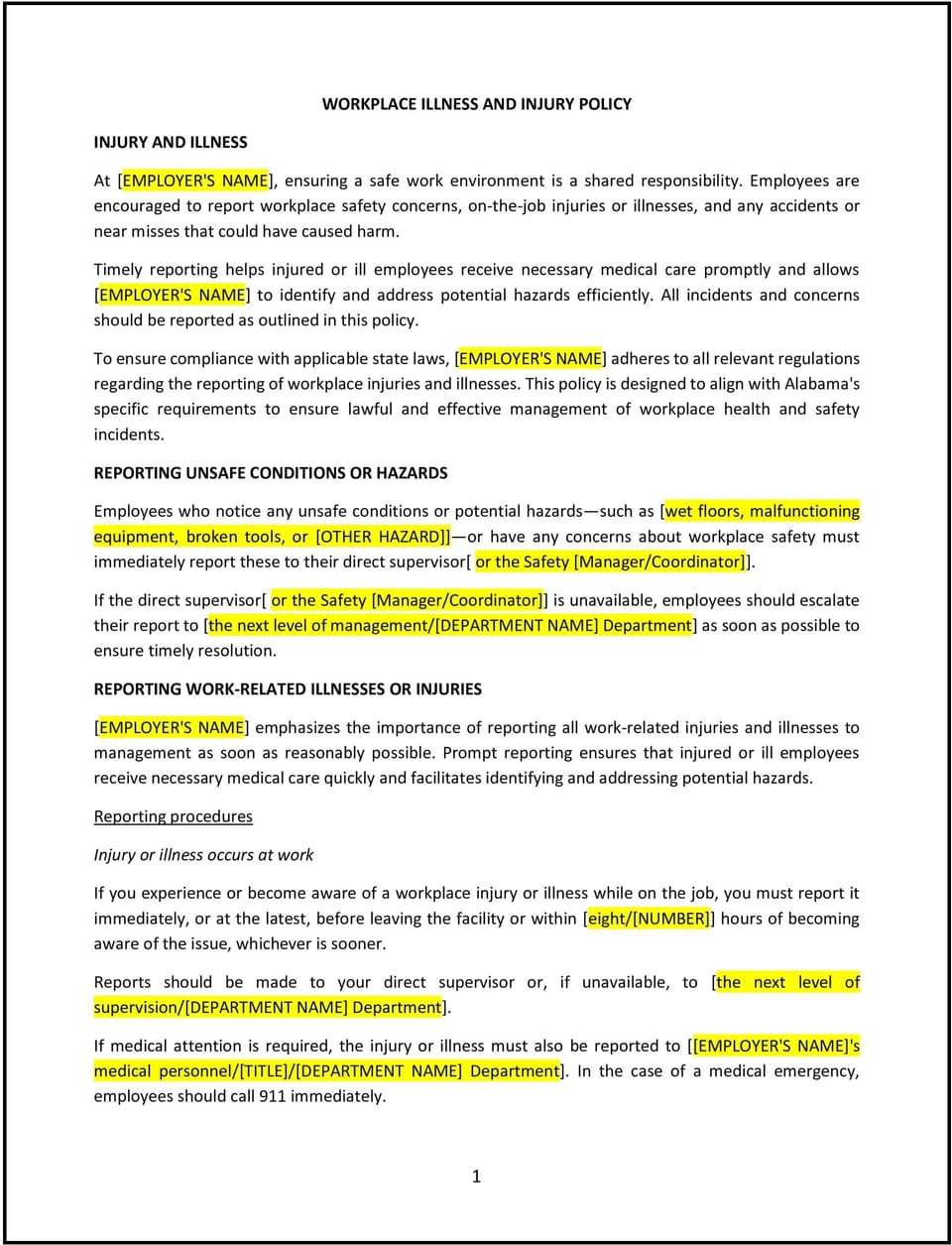Workplace illness and injury policy (Alabama): Free template

Workplace illness and injury policy (Alabama)
A workplace illness and injury policy outlines the procedures and responsibilities for preventing, reporting, and addressing work-related illnesses and injuries. For SMBs in Alabama, this policy promotes a safe work environment and ensures compliance with state and federal workplace safety regulations, including OSHA requirements.
This policy provides clear guidance on employee and employer roles in maintaining safety, handling incidents, and managing recovery or return-to-work processes.
How to use this workplace illness and injury policy (Alabama)
- Define covered incidents: Specify which types of workplace illnesses and injuries are covered, including physical injuries, exposure to hazardous materials, and stress-related conditions.
- Establish reporting procedures: Detail how employees should report illnesses or injuries, including required documentation and designated contacts (e.g., HR or a safety officer).
- Include response protocols: Outline steps to take after an incident, such as providing first aid, contacting emergency services, and completing incident reports.
- Emphasize prevention: Highlight proactive measures, such as safety training, regular inspections, and proper equipment use, to minimize risks.
- Address return-to-work processes: Specify how employees recovering from workplace injuries or illnesses will be supported, including accommodations and medical clearance requirements.
Benefits of using a workplace illness and injury policy (Alabama)
A workplace illness and injury policy protects employees and the business by fostering a safe environment. Here’s how it helps:
- Enhances safety: Encourages proactive measures to reduce workplace risks and protect employees from harm.
- Supports compliance: Aligns with Alabama and federal workplace safety laws, minimizing legal and financial risks.
- Improves incident management: Provides a clear framework for handling illnesses and injuries, ensuring timely and effective responses.
- Reduces downtime: Helps employees recover and return to work efficiently, maintaining productivity and morale.
- Builds trust: Demonstrates the company’s commitment to employee well-being and workplace safety.
Tips for implementing a workplace illness and injury policy (Alabama)
- Conduct regular training: Offer safety training to employees to help them identify hazards and respond appropriately to incidents.
- Create a reporting culture: Encourage employees to report hazards, near misses, and incidents without fear of retaliation.
- Use safety audits: Perform regular workplace safety inspections to identify and address potential risks.
- Provide access to resources: Ensure employees know how to access first aid supplies, emergency contacts, and support services.
- Review and update: Regularly assess the policy to reflect changes in workplace operations, legal requirements, or industry best practices.
Q: What types of incidents should SMBs address in this policy?
A: The policy should cover physical injuries, illnesses caused by workplace conditions, exposure to hazardous substances, and work-related stress or repetitive strain injuries.
Q: How should employees report workplace illnesses or injuries?
A: Employees should report incidents immediately to their supervisor or HR, providing details about the event and completing required documentation.
Q: What steps should SMBs take after an incident is reported?
A: Immediate actions include providing medical assistance, investigating the incident, and submitting necessary reports to OSHA or state authorities if required.
Q: Are SMBs required to provide accommodations for injured employees?
A: Yes, reasonable accommodations should be provided to support injured employees in returning to work, as required by federal and Alabama laws.
Q: How can SMBs prevent workplace injuries and illnesses?
A: Prevention strategies include regular safety training, equipment maintenance, clear signage, and conducting workplace risk assessments.
Q: How often should this policy be reviewed?
A: The policy should be reviewed annually or after any significant workplace changes, incidents, or updates to Alabama or federal safety regulations.
This article contains general legal information and does not contain legal advice. Cobrief is not a law firm or a substitute for an attorney or law firm. The law is complex and changes often. For legal advice, please ask a lawyer.


